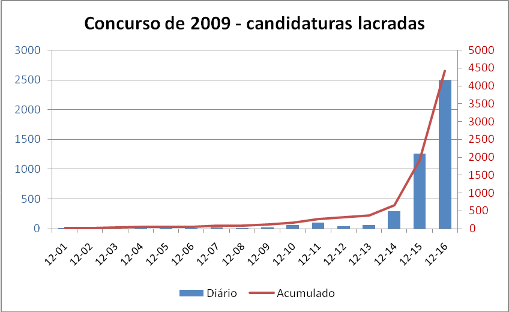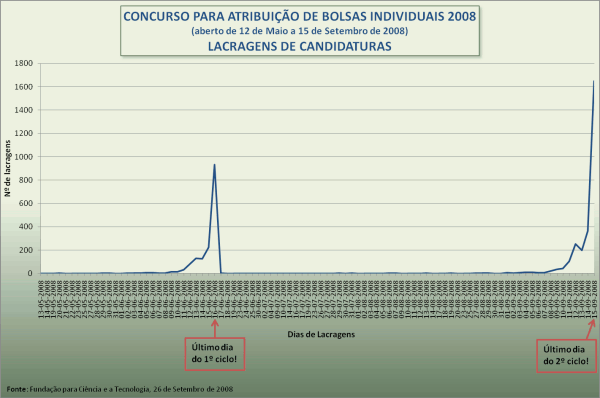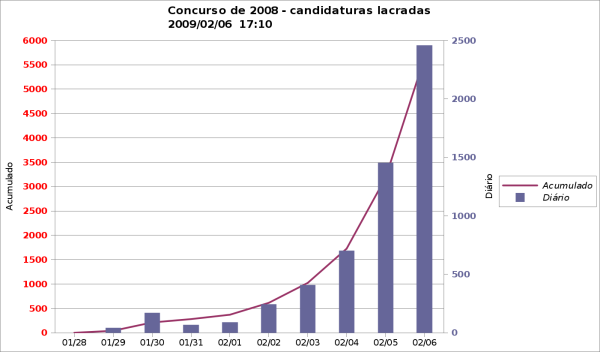Large FCT Calls
FCT organizes calls with a large spectrum of characteristics. Some of these involve thousands of applicants. This page contains information for applicants to such calls.
Basic advice
- Plan and complete your application as soon as possible.
- Make an early visit to all sections of the web application to ascertain what information is requested, and collect in time all necessary data for the submission (e.g., public keys from team members, advisers,...).
- Read carefully the documentation including the FAQ list. The majority of your questions will have been already considered and answered in such documents. Do this before contacting FCT with your questions.
- The Call Notice and the Regulations contain important information that you must be familiar with before you start filling the application. Do not miss reading them carefully.
- You will probably get warnings or error messages from the web application while you fill the application; do not postpone correcting them. Correcting all such problems near the call deadline may become an unsurmountable task.
- The system gives explanations for each error. Read and interpret them carefully and act accordingly. This will be much more efficient than reporting them raw to FCT services.
- Usually a final validation procedure is run before sealing the application that may detect additional problems. Running it near the deadline is a lousy idea.
- Do not assume that the web application or the submission rules were kept unaltered since the last time you applied to the same type of call. For instance: following the example of European Commission Calls, large FCT calls close at 5 pm, Lisbon local time.
An example: the 2008 Call for Individual Grants
The graphic illustrates something which is almost a statistical certainty. The convenience of electronic submissions to a relatively complex administrative procedure allows the accumulation of its final acts near the deadline(s) (in this case 2). Most candidates will not feel this accumulation but, for a relatively small number, which in absolute terms may be significant, this may mean that the existence of a question, anomaly or some other perturbation near the deadline may have dire consequences to the ability to submit the application. Note that the human resources that FCT may allocate to help candidates are essentially constant with a small increase near the deadline which is certainly insufficient near the final rush.
Probably the best advice that one may give to a candidate to large calls such as we are discussing is: plan and complete your application process at the earliest possible time. This way one guarantees the best possible support.
The characteristics of the graph on this page are not a weird coincidence, do not change for R&D Projects, or for Calls organized by other organizations, and are not a national procrastinating quirk. Believe us!
Another example: the 2008 Call for Projects in all scientific domains
The graph does not include 171 applications sealed administratively by FCT.
Still another example: the call for projects 2009

Analysis of anomalies
FCT receives, frequently and immediately after the closure of project calls submission periods, in particular large dimension calls as the ones that are held every year in all scientific domains, requests from researchers who have not submitted their project asking to be allowed to complete and submit the application. Typically the number of such requests is about 30 in a universe of about 5000 applications (~0,5%).
Keep in mind that FCT, on its own and as a standard procedure, audits any circunstances which have caused last minute technical difficulties preventing the submission of applications considering as relevant cases where the origin of the problem points to its own systems. As a rule, FCT does not consider as relevant techical problems not originating in its systems (there are obvious exceptions, say a blackout in a significant part of the country during a significant period). The number of such cases has decreased dramatically in recent years: 2 in the 2009 call, 1 in the 2010 call.
As for requests coming from researchers, they are analysed looking for more than one of the following factors:
- applications essentially completed, in particular, without errors preventing validation of important parts of the application.
- technical problems attributable to FCT.
- detection of problems late in the call preventing solution in time by normal means.
By themselves arguments such as the ones exemplified below are not considered relevant:
- “I needed more time”;
- “this way the work of weeks is lost”;
- “the call closed when I only needed to press one button”;
- “I thought you were going to postpone”;
- “the forms are very hard to complete”;
- “the network was slow”;
- “it was the fault of my institution”.
Essentially FCT claims that, calls being open during a two month period, bad management of the available time by the PIs, not taking into account the possibility of accidents and difficulties, is completely their own responsibility.
- Construction work
- Technical-financial auditing concerning expenses under plurianual funding 2003/8
- Technical-financial auditing concerning expenses of R&D institutions in the 1st semester of 2007
- Software Development and Parametrization for Intranet Environment in the framework of a Collaborative System
- Expense validation services in the framework of R&D projects

